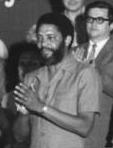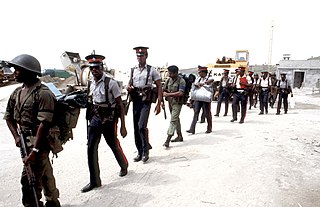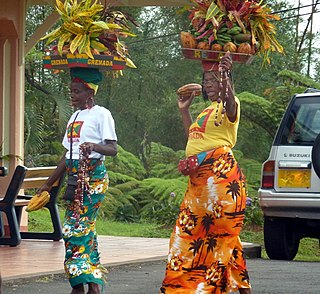Related Research Articles
The history of islands of Grenada in the Caribbean, part of the Lesser Antilles group of islands, covers a period from the earliest human settlements to the establishment of the contemporary nationstate of Grenada.

The United States invasion of Grenada began at dawn on 25 October 1983. The United States and a coalition of six Caribbean nations invaded the island nation of Grenada, 100 miles (160 km) north of Venezuela. Codenamed Operation Urgent Fury by the U.S. military, it resulted in military occupation within a few days. It was triggered by the strife within the People's Revolutionary Government which resulted in the house arrest and execution of the previous leader and second Prime Minister of Grenada Maurice Bishop, and the establishment of the Revolutionary Military Council with Hudson Austin as Chairman. The invasion resulted in the appointment of an interim government, followed by elections in 1984.

Maurice Rupert Bishop was a Grenadian revolutionary and the leader of New Jewel Movement – a Marxist–Leninist party which sought to prioritise socio-economic development, education, and black liberation – that came to power during the 13 March 1979 revolution that removed Eric Gairy from office. Bishop headed the People's Revolutionary Government of Grenada from 1979 to 1983, when he was dismissed from his post and executed during the coup by Bernard Coard, leading to upheaval.
Winston Bernard Coard is a Grenadian politician who was Deputy Prime Minister in the People's Revolutionary Government of the New Jewel Movement. Coard launched a coup within the revolutionary government and took power for three days until he was himself deposed by General Hudson Austin.

The New Joint Endeavor for Welfare, Education, and Liberation, or New JEWEL Movement (NJM), was a Marxist–Leninist vanguard party in the Caribbean island nation of Grenada that was led by Maurice Bishop.

Sir Paul Godwin Scoon was a Grenadian politician who served as Governor-General of Grenada from 1978 to 1992. His tenure is notable for its hectic events related to the rise and fall of the People's Revolutionary Government, as well as his personal involvement and support of the Invasion of Grenada.

The People's Revolutionary Government (PRG) was proclaimed on 13 March 1979 after the Marxist–Leninist New Jewel Movement overthrew the government of Grenada in a revolution, making Grenada the only socialist state within the Commonwealth. The government suspended the constitution and ruled by decree until a factional conflict broke out, culminating in an invasion by the United States on 25 October 1983.

Maurice Bishop International Airport, formerly known as Point Salines Airport, is an international airport located in the parish of St. George's. The town of St. George's is about 5 mi (8.0 km) north of the airport and is the capital of the island nation of Grenada. The airport is located on Point Salines, the most southwestern point of the island. It is named after former Prime Minister Maurice Bishop, who championed the construction project in 1979.
Hudson Austin is a former general in the People's Revolutionary Army of Grenada. After the killing of Maurice Bishop, he formed a military government with himself as chairman to rule Grenada.

The Royal Grenada Police Force (RGPF) is responsible for law enforcement in Grenada. The RGPF enforces criminal, immigration, and maritime laws. It is also held responsible for seaport security and fire services. With 15 police stations and 900 staff members, the force responds to over 15,000 crimes and incidents per year. The Royal Grenada Police Force also has a paramilitary force for national defense.

Grenada – United States relations are bilateral relations between Grenada and the United States. The United States recognized Grenada on the 7 February 1974, as the same day as Grenada got independence from the United Kingdom of Great Britain and Northern Ireland. These nations formally established diplomatic relations on 29 November 1974.

Grenada is an island country in the West Indies in the Caribbean Sea at the southern end of the Grenadines island chain. Grenada consists of the island of Grenada itself, two smaller islands, Carriacou and Petite Martinique, and several small islands which lie to the north of the main island and are a part of the Grenadines. It is located northwest of Trinidad and Tobago, northeast of Venezuela and southwest of Saint Vincent and the Grenadines. Its size is 348.5 square kilometres (134.6 sq mi), and it had an estimated population of 112,523 in July 2020. Its capital is St. George's. Grenada is also known as the "Island of Spice" due to its production of nutmeg and mace crops.

The Caribbean Peace Force (CPF), also known as the Caribbean Peacekeeping Force and the Eastern Caribbean Peace Force (ECPF), was a 350-member peacekeeping force operating in Grenada from October 1983 to June 1985 after the Invasion of Grenada, codenamed Operation Urgent Fury. The military intervention by the United States of America in coalition with six Caribbean nations was in response to the illegal deposition and execution of Grenadan Prime Minister Maurice Bishop on Oct. 19, 1983. Bishop's revolutionary regime was briefly replaced by a military junta composed entirely of Grenadian military officers. On October 25, 1983, the United States, Barbados, Jamaica and members of the Organisation of Eastern Caribbean States landed on Grenada, defeated Grenadian and Cuban resistance and overthrew the military government of Hudson Austin.

Afro-Grenadians or Black Grenadians are Grenadian people of largely African descent. This term is not generally recognised by Grenadians or indeed Caribbeans. They usually refer to themselves simply as Black or possibly Black Caribbean. The term was first coined by an African Americans history professor, John Henrik Clarke (1915–1998), in his piece entitled A Note on Racism in History. The term may also refer to a Grenadian of African ancestry. Social interpretations of race are mutable rather than deterministic and neither physical appearance nor ancestry are used straightforwardly to determine whether a person is considered a Black Grenadian. According to the 2012 Census, 82% of Grenada's population is Black, 13% is mixed European and black and 2% is of Indian origin.

The People’s Revolutionary Army (PRA) was the military of Grenada between 1979 and 1983.
Francis Alexis, Grenadian politician and lawyer, currently serves as President of the Grenada Bar Association. He is also the leader of the Democratic Labour Party (DLP).
The Grenada Democratic Movement (GDM), chaired by Dr. Francis Alexis, emerged in May 1983 as an alliance of various exile groups opposed to the Maurice Bishop regime. The group was founded by Roy McBain in Brooklyn, New York. Centrist in ideology, its members comprise a large number of university-educated Grenadians, including several former supporters of the People's Revolutionary Government who became disenchanted with its Marxist-Leninist orientation. The GDM merged with two other parties in 1987 to form the New National Party.
The Mongoose Gang was a private army or militia which operated from 1967 to 1979 under the control of Sir Eric Gairy, the Premier and later Prime Minister of Grenada, and head of the Grenada United Labour Party. Officially, Mongoose Gang members were called Special Reserve Police (S.R.P.) or Volunteer Constables.
Sir John Augustus Fitzroy Watts KCMG CBE was a Grenadian dentist, politician and co-founder of the Grenada National Party.
Ann Peters is a Grenadian politician who previously served as health minister. A nurse by training, Peters has also served as a senator for the National Democratic Congress party and as president of the Grenada Nurses Association.
References
- 1 2 3 Walker, Gillian Glean. "The Witness and his Testmony, Alister Hughes, Grenada Newsletter". www.open.uwi.edu. Retrieved 2019-07-15.
- 1 2 "TimesMachine: Saturday December 9, 1989 - NYTimes.com". timesmachine.nytimes.com. Retrieved 2019-07-15.
- 1 2 3 "Alister Earl Hewitson Hughes [1919-2005]". The Grenada Revolution.